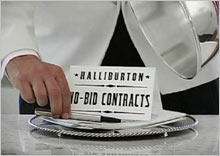It's a bad time to be a xenophobe
 Today I read the news that Spain's Telefonica is about to swallow up the British mobile phone company O2 for the princely sum of around £18-billion. Fine, it's business, no problem about that, I say to myself, but then I stop and wonder...
Today I read the news that Spain's Telefonica is about to swallow up the British mobile phone company O2 for the princely sum of around £18-billion. Fine, it's business, no problem about that, I say to myself, but then I stop and wonder...I'm sure everyone remembers the "Buy British" campaigns that used to run all the time back in the 70s. We'd be encouraged to seek out our local shops that sold locally-produced goods, buy a British-made car or shop at Mark's & Spencer's (in the days before it sold its soul for a boxload of Chinese bras).
But that was all before the g-word. Globalisation. No more international barriers to trade, the free movement of capital and labour across borders; instead we have GATT and the World Trade Organisation.
What's a xenophobe to do? How many crusty old colonels in the Home Counties are inflating themselves, ready to deliver themselves of a stiff letter to the "Telegraph", complaining that it no longer is possible to buy British because there's no such thing as a British company any more?
As far as I can tell, pretty much everything we buy, borrow or lease is ultimately owned by someone who does not call this country their own. So if I choose to buy my electricity from Company X Ltd of the UK, I can do a little investigation and find that Company X Ltd of the UK is actually 51.6% owned by Société Anonyme Q GmbH of Frankfurt, with the holding account based at a brass plaque in downtown Lichtenstein.
The company I bought my mobile phone from is American. Most people own an American, Finnish, Japanese or French phone. I don't know of any that are made here. My car is clearly French, but a quick perusal of the carmaker's website reveals that it has about 542 agreements, joint ventures and projects going on with other carmakers; a veritable Gordian knot of cooperation. Much of my wardrobe comes from sweatshops somewhere east of here. My bank proudly asserts its local knowledge of all four corners of the earth.
All of which is beginning to persuade me that in the world of business, nationality is dead. The only reason for locating a business in any particular country is that, well, a company has to be based somewhere.
But once you move out of the realm of business, your nationality becomes very important indeed. For a start, coming from certain countries entitles you to fast-track service at airport passport desks. Or it entitles you to a punishing four-hour interrogation, complete with cavity search by a big-boned lady who was never given a teddy bear to play with as a child. Or it entitles you to walk, blissfully free of care, from one hot-spot to another, safe in the knowledge that your particular piece of the globe never gave cause for concern to the rest.
It's reassuring and oddly comforting to know that I can travel up to two thousand miles east from here and not be asked once for my documents, visa, fingerprints or work permit. And equally reassuring to know that every single company that I ever do business with as a customer at home is following me around, eager to relieve me of yet more of my hard-earned.
Money is a commodity that has no need of a passport. Nor will we soon.







